Ten common mistakes Python beginners make
The following 10 common mistakes made by Python beginners are not real coding errors. The code can still run, but it is not Pythonic because Python has its own language philosophy and is simple in code processing that traditional languages cannot match. sex and convenience.

1. Truth value comparison
Beginners often use the == comparison operator in if statements to determine whether an expression is true.
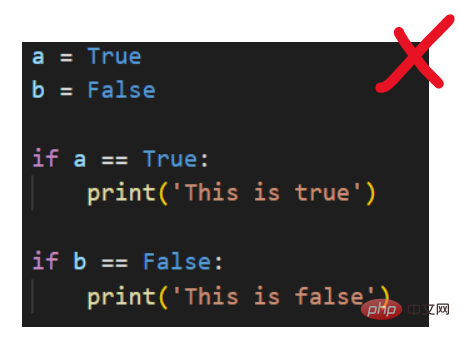
#This is a redundant way of writing. In fact, you can check the variable directly.
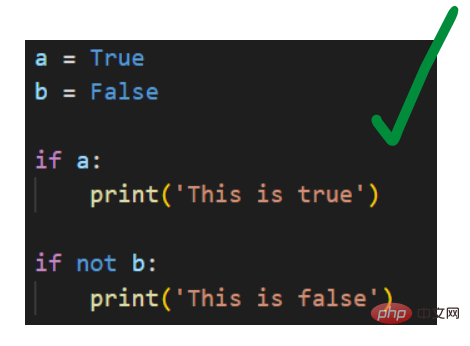
2. String concatenation
In many beginner tutorials, they will tell you that string concatenation uses the operator directly.
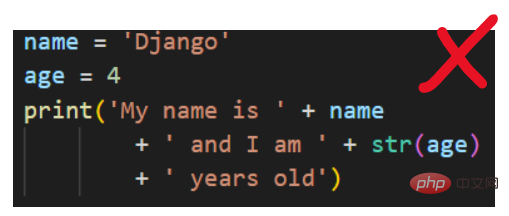
A more elegant way of writing is to use the f-string method and place the variables in {}. This method makes the code clear and easy to read, because you don’t need to target Non-string variables are forced to convert.

3. open(), close() and context manager
When operating files, the following code looks very readable. Open File, edit file, close file. But in the end you always have to manually call the close method to close the file.
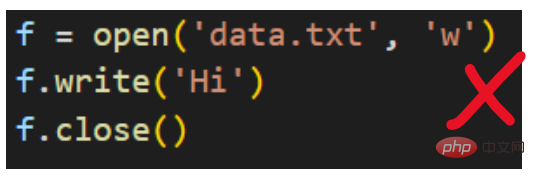
In fact, python provides a built-in context manager. When operating a file, use the with keyword to operate the file, so that you do not need to handle the closing operation of the file yourself. After leaving The context front manager will automatically close the file for you.

4. Check whether the list is empty
Suppose you want to do some operations based on the list. Before operating, you need to determine whether the list is empty. Beginners usually The len method will be used to determine whether the length of the list is 0, and subsequent operations will be performed.

Experienced developers will tell you that a better way is to directly use the list itself to determine whether the list is empty

5. Get the key and value from the dictionary
If you want to list and print all the elements in the dictionary, first you need to get the key of each element, and then get the corresponding value through the key value. Beginners usually treat the two steps separately.
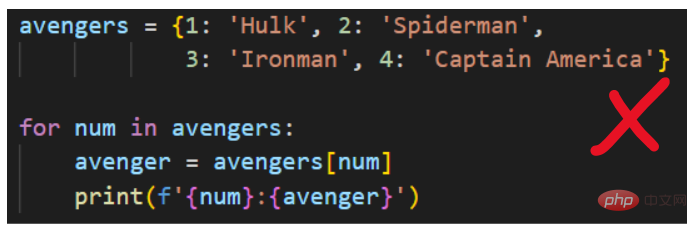
A more convenient method is that the dictionary's items() method will return an iterable object consisting of (key, value) tuples,

6. Destructuring assignment
Tuple is a fixed-length data structure in python. When novices assign the elements in the tuple to multiple different variables, they The usual approach is to assign values to variables one by one from the tuple
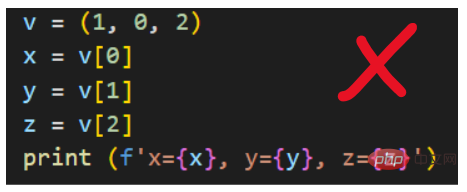
. A better approach is to use destructuring directly in one line of code to deconstruct the tuples. Groups are assigned to multiple different variables at the same time.
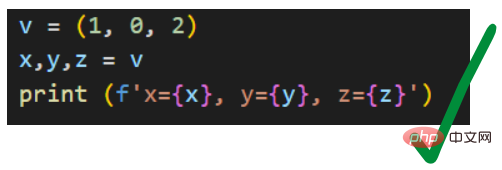
7. List iteration
For novices, when using a for loop to iterate elements in a list, their usual approach is to get the list first length, and then get the value by the subscript index of the element.

In fact, a more professional approach is to directly iterate the list itself. The value of each iteration is the element in the list

8. One index for multiple lists
Suppose you want to add the values in two lists. Usually, you will loop from index 0 to the end of the list, and add the list each time Add items to form a new list
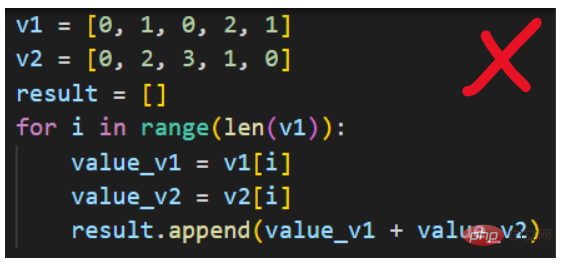
Python provides a better method zip(), which recombines two list objects into a tuple that appears in pairs Element list
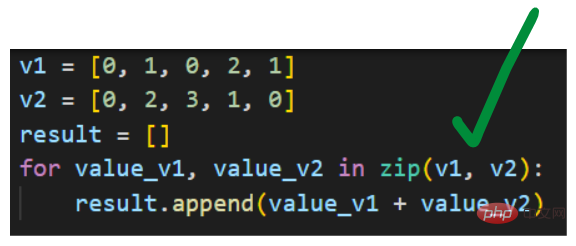
9. Walrus operator
Before python3.8, when a variable acts on the if judgment statement, it must be assigned a value first Then process
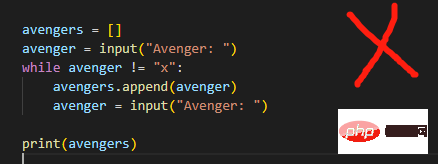
The walrus operator of python3.8 allows your code to reduce duplication and look more concise. You can process variable assignment and if judgment in one line.

10. Unnecessary indexes
If you have a text list and you want to print it together with the subscript index, you can define a separate numeric variable for each Increment by 1 for each iteration itself

The above is the detailed content of Ten common mistakes Python beginners make. For more information, please follow other related articles on the PHP Chinese website!

Hot AI Tools

Undresser.AI Undress
AI-powered app for creating realistic nude photos

AI Clothes Remover
Online AI tool for removing clothes from photos.

Undress AI Tool
Undress images for free

Clothoff.io
AI clothes remover

AI Hentai Generator
Generate AI Hentai for free.

Hot Article

Hot Tools

Notepad++7.3.1
Easy-to-use and free code editor

SublimeText3 Chinese version
Chinese version, very easy to use

Zend Studio 13.0.1
Powerful PHP integrated development environment

Dreamweaver CS6
Visual web development tools

SublimeText3 Mac version
God-level code editing software (SublimeText3)

Hot Topics
 How to control the size of XML converted to images?
Apr 02, 2025 pm 07:24 PM
How to control the size of XML converted to images?
Apr 02, 2025 pm 07:24 PM
To generate images through XML, you need to use graph libraries (such as Pillow and JFreeChart) as bridges to generate images based on metadata (size, color) in XML. The key to controlling the size of the image is to adjust the values of the <width> and <height> tags in XML. However, in practical applications, the complexity of XML structure, the fineness of graph drawing, the speed of image generation and memory consumption, and the selection of image formats all have an impact on the generated image size. Therefore, it is necessary to have a deep understanding of XML structure, proficient in the graphics library, and consider factors such as optimization algorithms and image format selection.
 Is there any mobile app that can convert XML into PDF?
Apr 02, 2025 pm 08:54 PM
Is there any mobile app that can convert XML into PDF?
Apr 02, 2025 pm 08:54 PM
An application that converts XML directly to PDF cannot be found because they are two fundamentally different formats. XML is used to store data, while PDF is used to display documents. To complete the transformation, you can use programming languages and libraries such as Python and ReportLab to parse XML data and generate PDF documents.
 Is the conversion speed fast when converting XML to PDF on mobile phone?
Apr 02, 2025 pm 10:09 PM
Is the conversion speed fast when converting XML to PDF on mobile phone?
Apr 02, 2025 pm 10:09 PM
The speed of mobile XML to PDF depends on the following factors: the complexity of XML structure. Mobile hardware configuration conversion method (library, algorithm) code quality optimization methods (select efficient libraries, optimize algorithms, cache data, and utilize multi-threading). Overall, there is no absolute answer and it needs to be optimized according to the specific situation.
 How to convert XML files to PDF on your phone?
Apr 02, 2025 pm 10:12 PM
How to convert XML files to PDF on your phone?
Apr 02, 2025 pm 10:12 PM
It is impossible to complete XML to PDF conversion directly on your phone with a single application. It is necessary to use cloud services, which can be achieved through two steps: 1. Convert XML to PDF in the cloud, 2. Access or download the converted PDF file on the mobile phone.
 Is there a mobile app that can convert XML into PDF?
Apr 02, 2025 pm 09:45 PM
Is there a mobile app that can convert XML into PDF?
Apr 02, 2025 pm 09:45 PM
There is no APP that can convert all XML files into PDFs because the XML structure is flexible and diverse. The core of XML to PDF is to convert the data structure into a page layout, which requires parsing XML and generating PDF. Common methods include parsing XML using Python libraries such as ElementTree and generating PDFs using ReportLab library. For complex XML, it may be necessary to use XSLT transformation structures. When optimizing performance, consider using multithreaded or multiprocesses and select the appropriate library.
 What is the function of C language sum?
Apr 03, 2025 pm 02:21 PM
What is the function of C language sum?
Apr 03, 2025 pm 02:21 PM
There is no built-in sum function in C language, so it needs to be written by yourself. Sum can be achieved by traversing the array and accumulating elements: Loop version: Sum is calculated using for loop and array length. Pointer version: Use pointers to point to array elements, and efficient summing is achieved through self-increment pointers. Dynamically allocate array version: Dynamically allocate arrays and manage memory yourself, ensuring that allocated memory is freed to prevent memory leaks.
 How to evaluate the quality of XML conversion to images?
Apr 02, 2025 pm 07:33 PM
How to evaluate the quality of XML conversion to images?
Apr 02, 2025 pm 07:33 PM
The quality evaluation of XML to pictures involves many indicators: Visual fidelity: The picture accurately reflects XML data, manual or algorithm evaluation; Data integrity: The picture contains all necessary information, automated test verification; File size: The picture is reasonable, affecting loading speed and details; Rendering speed: The image is generated quickly, depending on the algorithm and hardware; Error handling: The program elegantly handles XML format errors and data missing.
 How to open xml format
Apr 02, 2025 pm 09:00 PM
How to open xml format
Apr 02, 2025 pm 09:00 PM
Use most text editors to open XML files; if you need a more intuitive tree display, you can use an XML editor, such as Oxygen XML Editor or XMLSpy; if you process XML data in a program, you need to use a programming language (such as Python) and XML libraries (such as xml.etree.ElementTree) to parse.






